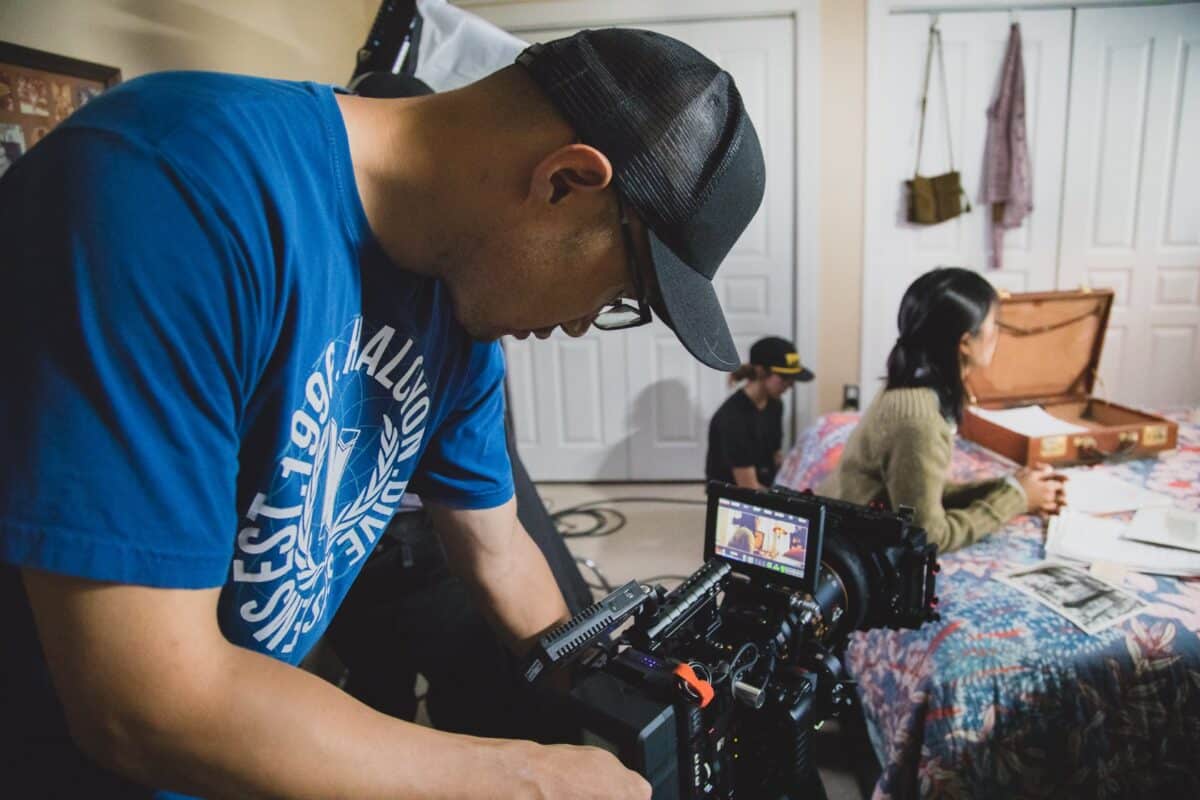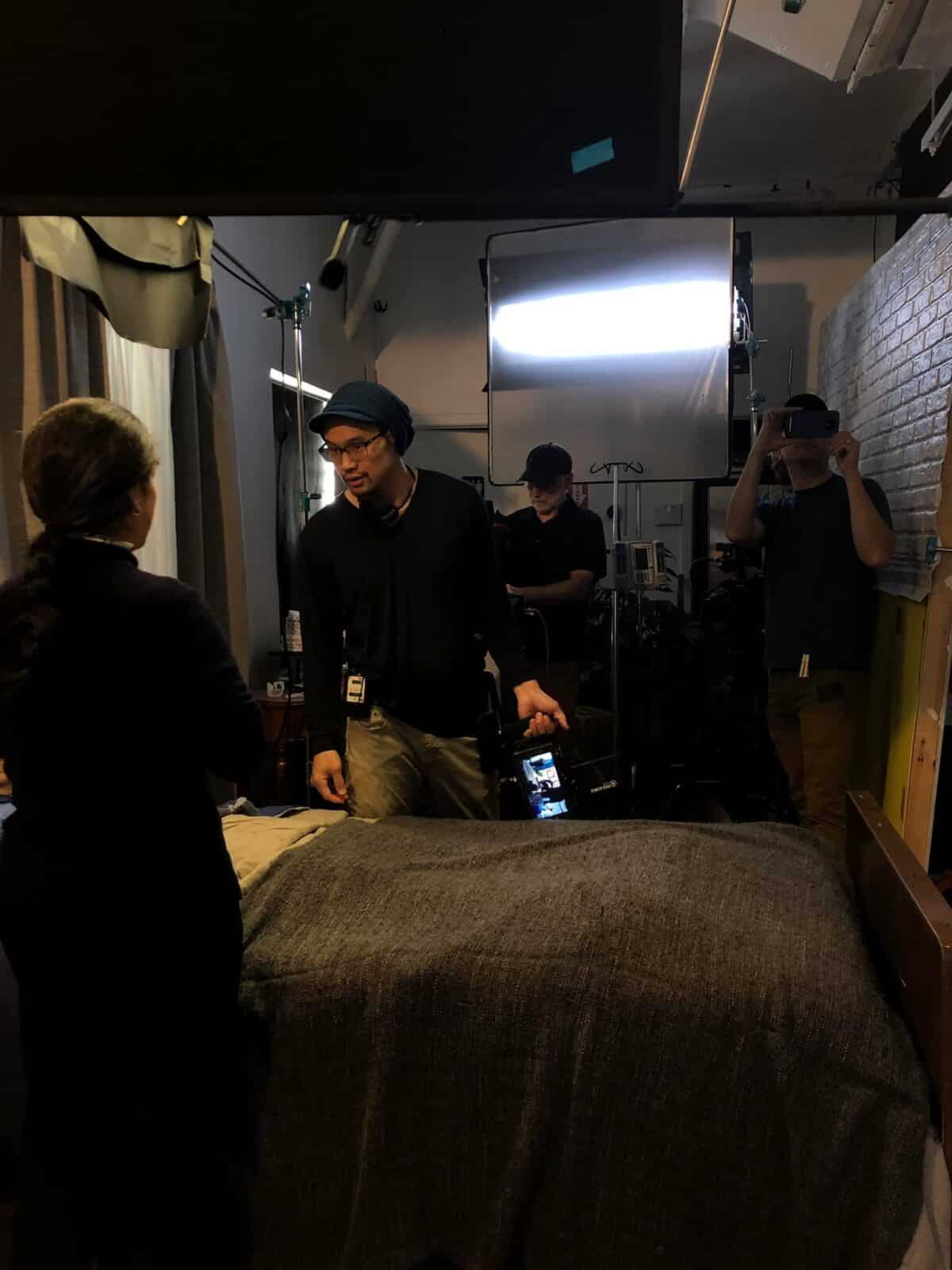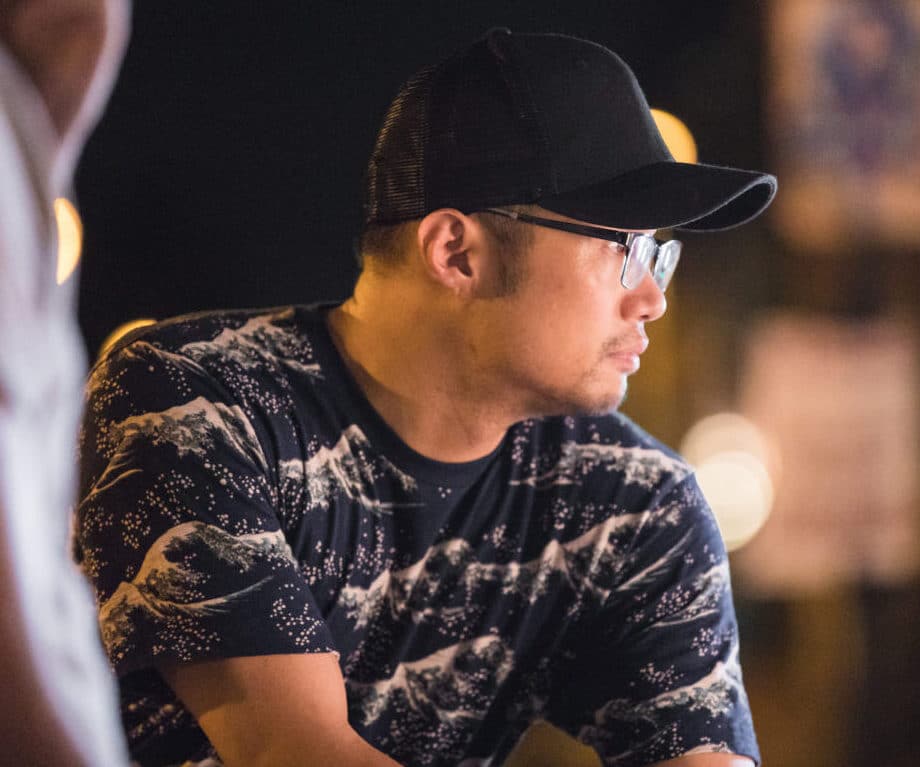
One goal within the Project Forte initiative is to cut through the noise of the status quo, amplifying the voices of creatives within our industry who might not raise themselves aggressively above the clamor. One such filmmaker is Erik Lu, a director whose presence reaches from Philadelphia to LA, and whose influence settles deeper and wider than that, without ever the need for raising his voice. His body of work digs into human psychology, history, language, and behavior with vignettes that feel determined yet respectful. To imbibe a tale from Erik Lu is to be a ghost within the world he has built, skillfully and fully – more present than a viewer but less than a character. When experiencing them, one feels that no detail is out of place, nor is it added or subtracted without device, giving these stories and characters purpose and dimension. Always questioning the decisions made in film, whether those worlds are his own or his contemporaries, Erik Lu stays hungry to be aware and to understand. These considerations prove a fuller grasp of “story” and that roundness is seen and felt within his work. He creates relationship as a personal art and as a relatable experience for the viewer.
Written and Edited by Kate Feher
_______________________________________________________________________________________________________________________
Erik Lu: My name is Erik Lu (he/him) and I am a Taiwanese-American director.
Kris Mendoza: You and I met through mutual friends and started talking about Asian film festivals, so let’s begin there, with Asian cinema overall. I know you to be very intentional about the crews you work with, not necessarily exclusively, but at least largely composed of other fellow Asian filmmakers who together carve out a community for telling Asian stories. My first question for you is what is the status of Asian cinema right now from your perspective? How has it evolved since you first encountered filmmaking in grad school? In other words, where are we in terms of Asian stories, and how far have we come?
Erik Lu: We are making great strides, but we still have a lot of work to do as far as Asian representation goes within cinema. I remember one of the earlier shows I had seen growing up was The Vanishing Son with Russell Wong. It was inspiring because I hadn’t seen somebody on-screen that resembled me like that before, and I felt it gave us a voice. But in the end, to me, it was like kicking the door open, without really walking through it.
The next film to make an impact on me was Better Luck Tomorrow, which pretty much did the same thing but it was the first time I’d seen that in the theaters and on the big screen, which was such a great representation for us. The only problem was, half of my friends couldn’t completely relate to it. As I remember, it felt more like a West Coast kind of story, and a lot of us East Coasters couldn’t identify with it. But still, it was extremely inspiring.
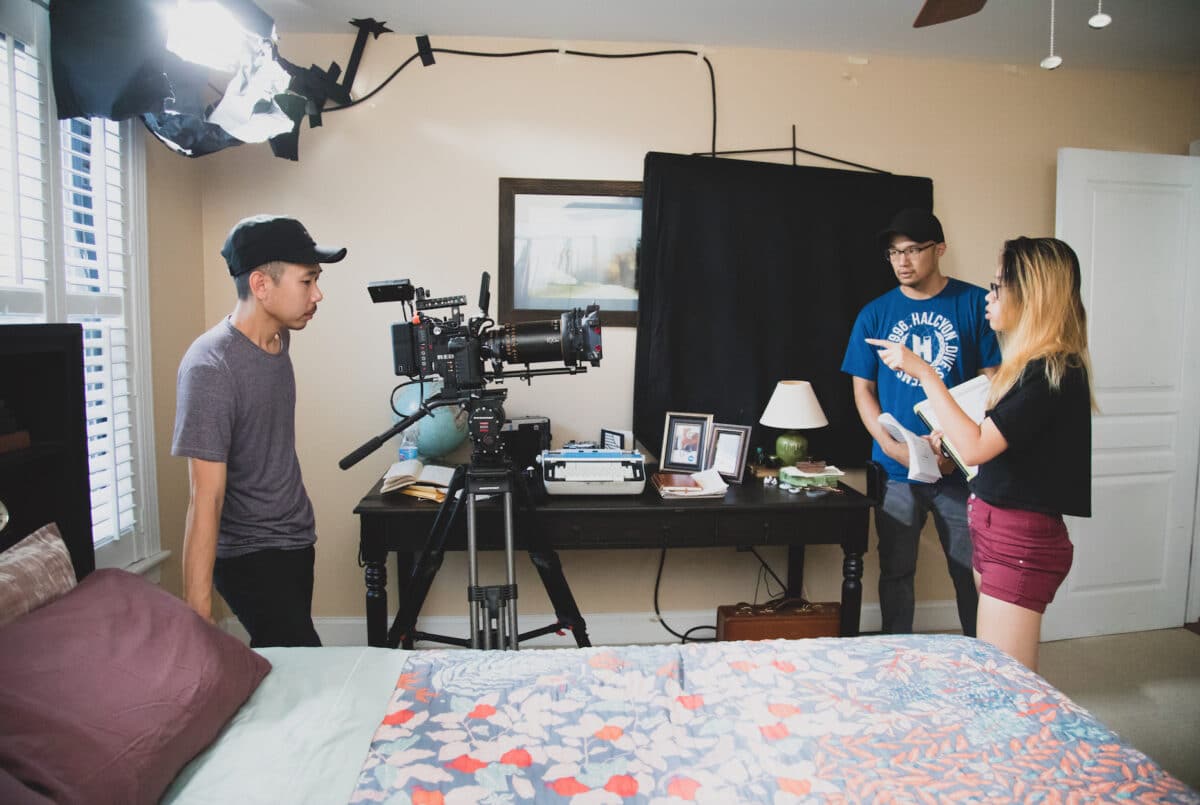
I believe the reason why we have a lot of work ahead of us is because of our place in America. We’re fairly new to the American historical timeline. Most of our parents immigrated from Asia recently so most of us grew up as second-generation kids. We’re often living an Asian lifestyle at home and have to adapt to an American one at school and at work. As young kids, identity can be confusing for us, and many of us have just become successive versions of our parents just shooting for a safe, stable, predictable living. Entertainment and the arts aren’t encouraged. This will take time to change.
The other point I would want to make is that jobs beget jobs. The more jobs we get, the more experience we get, the more we can work on our craft, the better we become, the more exposure we get, and the more influence we have to make this world a better place. And it all starts with Asian-American screenwriters writing great stories and creating jobs.
Kris Mendoza: I agree: 10, 15 years ago, a lot of Asian-American cinema (I call it APA cinema) focused on the question of “Who am I? Where do I belong? … How Asian am I? Vs How American am I? …” and that emphasis has shifted to Asian representation within everyday American life. An Asian man or woman can be a leading performer in a film because … they can, right? We shouldn’t have to ask “But why are they Asian?” and we’re slowly getting over that hump. We are walking through that door, but how do we build on that?
You and I have had spirited conversations about films like Crazy Rich Asians... Much of Hollywood is saying, “It must be proven that there’s an Asian-American population who will pay to go see those movies. We have expendable income, and the box office will define it.” Does that matter? And by that question I mean, with the success of a lot of recent, bigger, wider releases of Asian-American films or Asian films in the mainstream like Minari and Crazy Rich Asians, is it more important to prove there is a market or to prove that our stories are relatable to Americans, Asian or not?
People are focused on a very particular initiative: “We have to support this film and show that the Asian community is going to represent a lucrative patronage for Asian film.” What will motivate Hollywood to invest in Asian stories more? The promise of expendable income within Asian communities? Is that what’s important? Or is it more important to tell good stories that will not just pander and speak to the Asian crowd but be more inclusive to anyone and everyone who watches it?
Erik Lu: Who knows what exactly Hollywood will do. But we as artists know what we want to do. We can choose to be authentic and tell a real Asian-American story, hope it gets traction, and that Hollywood loves it. That would be the best case scenario. Or we could not. We could sell out and do what Hollywood wants. To me, at this point in time, it just matters what you do at the end. For example, Jay-Z’s early hip-hop stuff was really great. Then he ended up selling out and going very commercial, and his lyrics got lazy. He ended up getting a lot of money and a bigger name but I never got a sense he used his name and money to go back to his roots and showcase and develop similar underground artists.
Do I think everyone should sell out a bit to help out in the end? Of course not. It’s controversial. To me, if an actor accepts a job to do something stereotypical, and it leads to a lot of exposure and power, that actor could use it to give back to the Asian-American community. I can see it as a necessary evil. Three steps forward, two steps back. Slow progress is still progress.
Kris Mendoza: Yeah. Jay-Z began as underground hip-hop and he had a lot of lyrics that spoke to the streets… then he commercialized, got very successful, and was able to do whatever he wanted. This connects to Asian-American filmmaking because we are part of a very independent community on the APA side but also need these big blockbuster films to do well in order for people to trust us with more big studio work and bigger stories. Then once we have that trust, then the door is wide open for us –
There’s a lot of conversation about authenticity lately, in terms of story-telling. There are good stories and good Asian-American stories that are not told by or written by Asian-Americans, a lot of conjecture amongst folks who, even within businesses, are calling cultural appropriation left and right when you’re using a particular culture or background to push an agenda, push a product, service, or business forward. Whether it’s Asian-Americans or any other culture, why is it important that we are the ones telling these stories?
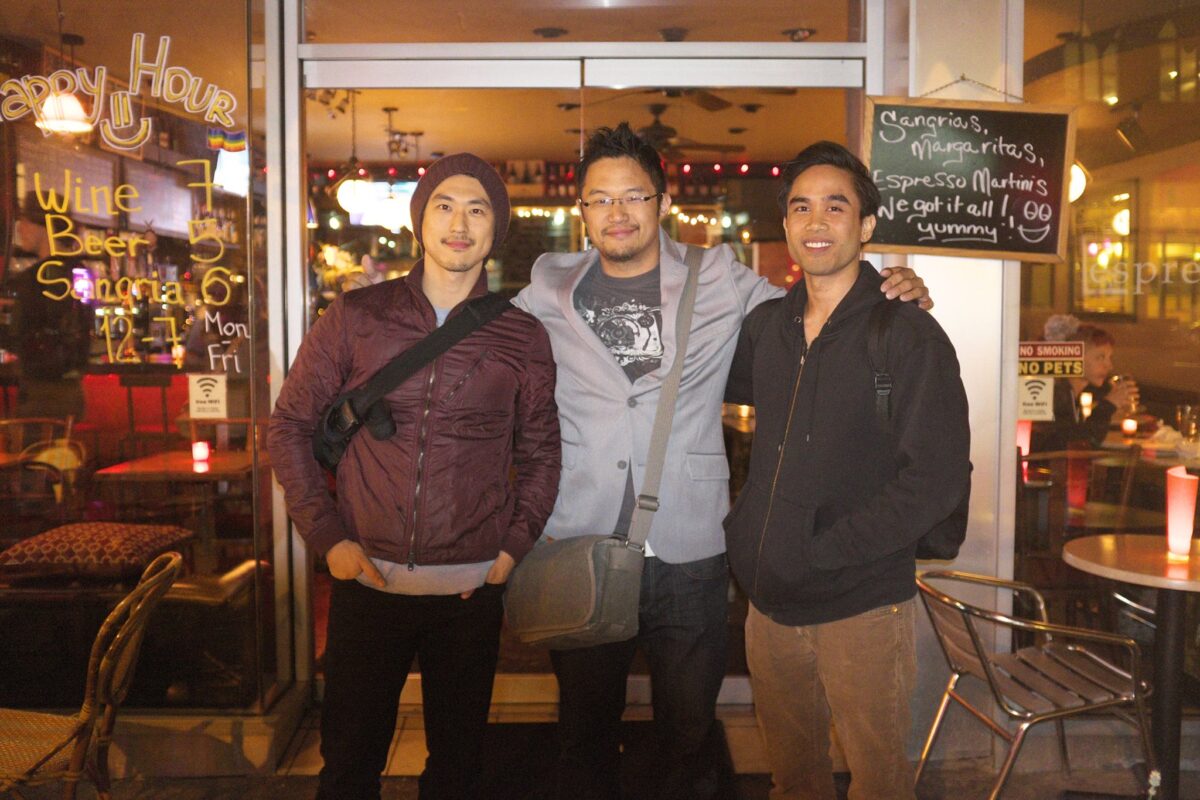
Erik Lu: Obviously, growing up in an Asian community or an Asian family, you absorb things via osmosis. You absorb the Asian-American community. Living your life is doing your research. There are little things, for example: how you would eat dinner or the subtle placement of chopsticks on the table, little minute things that you already know as an Asian-American writer that you wouldn’t need to do the research on. Even though a lot of Asian families are different, coming from that point of view, there’s a natural authenticity to it. That’s not to say a non-Asian writer cannot write an authentic Asian story. They can. It’s just that if they never lived in that community, they will have to spend a lot of time researching it.
There is one director that I really admire, Cary Fukunaga. He goes out of his way to research the world he’s filming. That’s what separates a good writer/director from another. Doing research. For example, when he wrote Sin Nombre, he went down to Latin America for a couple years, learning about the gang MS-13, putting himself in dangerous places in order to understand how they really operate. Failing to do adequate research is a problem many novice writers have. That’s where the adage “write what you know” comes from. I’m guilty of it myself at times of not doing enough research. When non-Asian writers don’t do their research and write Asian-American stories, its inauthenticity is very apparent.
It’s kind of like the humorous idea we have that you can tell an Asian restaurant is good by how many Asian people are in there. If there’s a lot, it’s probably going to be pretty good and authentic. If you see all non-Asian people, then you wonder, “okay, maybe the food is good, but is it authentic to that culture, or is it just catering to the mainstream?”
Kris Mendoza: Your allusion to restaurants made me think of when, say, a white male chef opens up a Thai restaurant, no one really says anything except maybe “Congratulations, you’re doing this cool cultural restaurant.”
But if a Thai chef tries to open up a French restaurant there’s a double standard. I do think the same thing applies to filmmaking. Right now, I think there’s a propensity to write what you know, tell our stories, tell authentic immigrant or Asian-American stories, but, at the end of the day, it’s got to evolve past that. An Asian-American writer or director can tell a non-Asian American story and still do it well. Take Chloe Zhao as the first female director to win a Golden Globe and, I think, is also nominated for an Academy Award for Nomadland. It had some star power with Frances McDormand but at the end of the day, that was not an Asian story. And you can’t take that away from Chloe Zhao, she’s still at the top of her game and her craft as a director, but the conversations around it suggest a double-edged sword presenting a question of “what types of stories can we tell and what we are qualified to tell?”
Erik Lu: I have no problem with a non-Asian person writing an Asian story, as long as they do their research: they live somewhere, they spend time absorbing the culture, and they communicate with the people there.
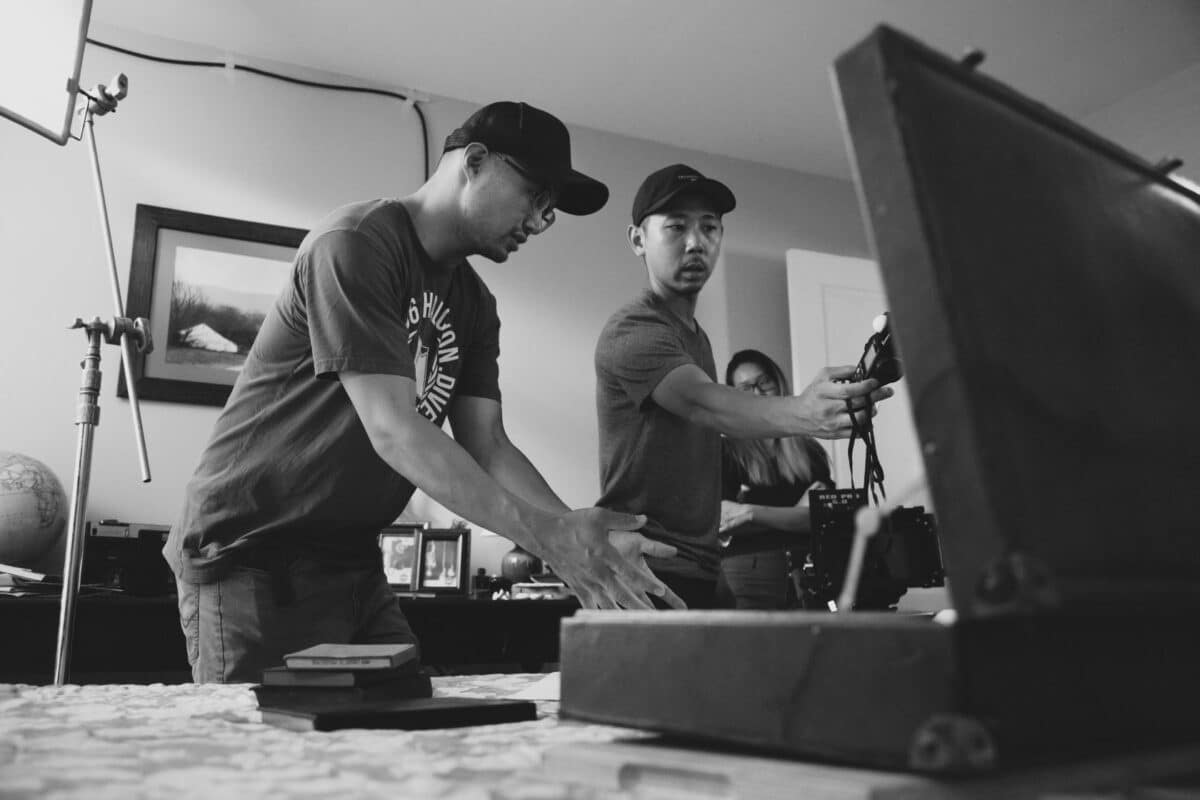
Kris Mendoza: As media-makers and storytellers, we have the ability to help shape perceptions of Asian-Americans in a positive light. Given this current climate of Asian hate and violent hate crimes against Asians, how did this evolve and what can we do as media-makers to help shift and change those perceptions?
Erik Lu: You mean why are we in such a hate-crime-filled environment?
Kris Mendoza: Yes. Has it always been like this? I have spoken to you before about my experiences with hate crime, 15 years ago now.. has it magnified? I mean, if you’re Asian in America you know this is not new. You, yourself, told me a story once about being on the hockey team, being the only Asian, and getting a lot of backhanded racist remarks in that regard. Can you tell us about that?
Erik Lu: I agree. I don’t think the resentment against Asian-Americans is new. Maybe in our current situation with COVID and the hostile political climate, people feel more justified in attacking or assaulting Asian-Americans. And you know what, I don’t think it’s solely non-Asians hurting us. Asians are also hurting us, in a way. For example, yesterday I saw an Asian woman who was eating a cooked turtle, chomping the turtle’s head off and just tearing it apart in a very barbaric kind of way. She was disrespecting the animal. It was gluttonous and revolting. It was a fairly new video that just came out, and it made me angry. And people attach that kind of content to all Asian-Americans, who have nothing to do with it nor want to be associated with it in any way.
About the hockey incident, when I was in high school, I was competing in a play-off game against another local team. This was about 1995. I was one of the better players on our team and the opponent high school knew that I was an athletic threat. Any time I touched the puck, the audience of fans from the rival school would chant, “USA! USA! USA!”
The first time I heard that, I thought, “That’s so strange because… I’m American. Why would the other team’s spectators be chanting for me?” They were trying to get under my skin. They were trying to alienate me in a racial way, and even my teammates knew that was really messed up.
My father, who had no idea what was going on, was also chanting, “USA, USA.” He didn’t understand. Kind of funny, kind of sad. That really shows the difference between our generations. The first generation came here to make a living and go about their business without bothering anyone, and the second generation is learning to speak up more and fight that not-so-subtle racism, recognizing the language and the intention better.
Even now, my father, and this was just a couple weeks ago, he bought a pizza and they charged him almost double the price. My dad just paid for it. I asked him, “Why didn’t you argue with them?” And he said, “Well, I didn’t want to cause any trouble. It’s okay. They’ve been nice.” But that’s a big issue for our generation right now because if there’s an injustice, whether it’s small or big, I think it’s something we have to speak up against.
It’s going to take a many generations to get to some point that resembles some kind of racial equality for Asian-Americans. It might even take longer. African-Americans have been at this for much longer than we have, and they’re still working at it. And I do think it’s a possibility that this may never fully end. But it could get to a point where the underlying racism could be suppressed enough that we can maybe get a good night’s sleep for once.
I have a bit of a cynical view when it comes to humans. I think that any time something different is introduced, people get scared, and they retaliate because of their own ignorance. Think about it. You don’t have to spend time and understand what you’re scared of. It’s much easier to retaliate and hate. It’s the path of least energy and consequently, the least rewarding. Learning about someone else and learning to love, it takes time, and patience, and being open-minded, but in the end is most rewarding. Sadly, humans tend to take the easy way out. So, the day when attacks on Asian-Americans goes down, another minority group is going to be targeted. Rinse and repeat. All we can hope for is to create a world where our loved ones can feel somewhat safe and protected. But I don’t think we are ever really going to get to a point where everyone is super happy and collaborative and in complete harmony.
Kris Mendoza: You hit it on the head – the first generation of immigrants in this country were just trying to fit in, and the second is trying to make their voices known, be less passive about fitting in, be more vocal about belonging here. Our parents made sacrifices for us to live the American life at the end of the day, and I think there is a tension between the two generations, with one being very passive and disapproving, when the next generation is more vocal and more advocate, whether we’re filmmakers or not.
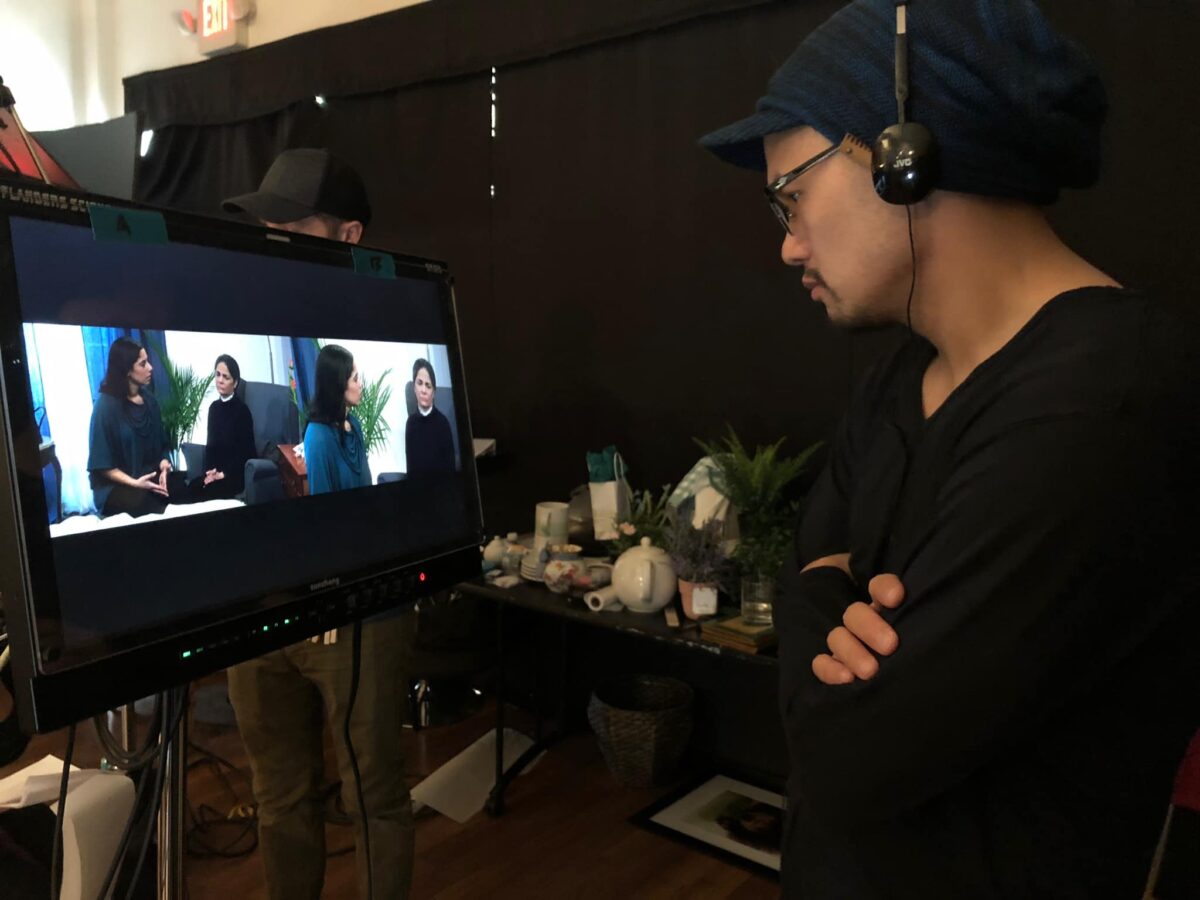
Do you feel that other media-makers, content-makers, scriptwriters, etc have a certain level of responsibility to push the envelope which keeps the Asian portrayal contained? Asians have been portrayed as passive, deli owners, dorks, non-sexualized male characters… I’m not saying you have to make an Asian gangster film or even that you shouldn’t, but do we have a responsibility to portray Asians in a certain light, more indicative and representative of what and how we really are?
Erik Lu: My view on this has changed over the years, to be honest. When I was in college I felt it was more important to make a good story and just have an Asian-American as the lead without making any references to being Asian-American. Now, my view is that you really don’t want to give studios, these powerful producers, a reason or excuse to cast a non-Asian person instead. I believe there’s a reason why a character is written as, say, Taiwanese, Chinese, or Filipino. As a writer, you have to successfully justify why your character is that ethnicity and make sure you stand your ground.
I believe that Asian-Americans can play all types of roles as long as the characters on screen reflect reality. We have Asian-Americans who are leading men and women and some who are actually computer scientists or who do martial arts. For some people it is. I don’t shun an Asian-Amerian writer making a kung fu story set in America. That’s completely fine if it is their reality. Maybe if we just inundate the market with leading Asian character roles, that might push the needle for us way far forward. Some films will succeed, and some will fail. And then we’ll see how much the needle falls back and much progress we make. Again, three steps forward, two steps back.
The reason I chose filmmaking versus painting, music, or any other creative medium is because I’m a soft-spoken guy. I’m not very vocal. I don’t get into huge debates. I’m not confrontational. I’m not a big public speaker. I’m also not as auditory as I am visual. So filmmaking, for me, is the loudest voice I have. I feel I can communicate to a large audience more effectively in this form than any other form.
Kris Mendoza: Are you able to be loud while using film as your means of communication? I mean, even though you personally feel like you’re a little softer-spoken, do you feel like you are able to use filmmaking as an amplifier for your voice where you wouldn’t otherwise communicate those ideas?
Erik Lu: I do feel like I’m louder in filmmaking. I could be in a room where nobody agrees with me, but when you believe in something so strongly, you have to go for it and, at some point, stop listening to the other people. You can get too much advice where it will confuse you. Of course, it’s important to consider everybody’s ideas. That’s just being respectful. And also recognize that you don’t always have the best ideas. But ultimately, when there are things that I feel have to be a certain way, I’m going to do everything I can to make it that way. Film allows me to express myself, and the more adamant I am about my vision, the louder the volume is on the metaphorical megaphone I’m holding. I’m not going to always succeed. More often than not, I’m going to fail. But there’s always a light at the end of the tunnel.
Kris Mendoza: You talked a little about Cary Fukunaga, Vanishing Son, Russell Wong, etc. Who are some early influences and inspirations for you as a budding director, young Erik Lu of the USC MFA program? Who did you look up to and maybe model your work after in terms of inspiration?
Erik Lu: I grew up doing a lot of art when I was young. I drew a lot. In elementary school or grade school, during math class or whatever academic class, I would actually be drawing portraits of my friends. So I was always interested in art. Then, in 10th grade, my parents said “You want to go to art school? You’re not going to make any money doing that. You should stop taking art classes and take some computer classes.” So I ended up taking some programming classes, though I don’t think my heart was in it. By the end of my junior year, I ended up getting an editing program and I made a music video to Mo Money Mo Problems by B.I.G. I was just fascinated by the process.
I had one friend at the time who wanted me to help her with a student project, and I did. She was a bit of an aggressive girl, kind of violent. One day, she slapped me on the back, literally slapped me on the back, and said, “Hey, you should do this for a living. You should go to film school.” I was like, “Nah, I’m not going to do that.” But I think a good idea sticks with you, and after a couple days or a few weeks, I felt I wanted to go to film school.
At that time, one of my friends, James Chen, who is an actor, had gotten into the Yale School of Drama one year before I got into USC. We were college friends at the time. He was inspirational to me because he’s got extreme ambition, is extremely hard-working, and very talented. He was super supportive of me in a lot of the things that I did. I was pretty new to film, and we would talk about filmmaking and theater for hours and hours. We keep each other going, and he’s one of the people in film I look up to.
Another strong influence for me is Michael Rosete. He’s an actor I had met in New York, and we did a lot of short films together. He is also extremely talented, super passionate about the craft, and truly dedicated. We share similar sensibilities, and he taught me a lot about the actor’s process and how to talk to an actor. We’ve been through crazy late night shoots, horrible weather, dangerous location shoots, and both of us have been battered by production together, but I enjoyed every single minute of it. He’s a great partner in crime and that’s what makes me admire him.
I really like David Fincher’s work. He’s a master at everything. It seems like he knows more about cinematography than the cinematographer does and more about coloring than the colorist does. He’s an expert at all trades, and I really look up to him.
Kris Mendoza: Were you also pre-med at Penn?
Erik Lu: I was pre-med. I was a double major, Biology and Asian/Middle Eastern studies. I didn’t do so well my first year at Penn because I was just partying like crazy. I didn’t find film until the start of my senior year, and at that point I started shooting weddings. I decided I wanted to get away, as far away from my parents as possible. My fine art teacher encouraged me with a list of schools and I wanted to go to LA so I took the summer session at USC. Then I took a couple years off, I worked as a Lifetouch photographer and was shooting 300 school portraits a day. I was still shooting weddings. Then when I found out I got into the production program at USC, I committed. USC is an interesting school because it has an established name, it’s extremely competitive, and you can make a few really good friendships, but then you can also make a lot of difficult ones because-
Kris Mendoza: A lot of competition.
Erik Lu: Yeah. I mean, because people are-
Kris Mendoza: I’ve heard.
Erik Lu: They’re so career-focused.
Kris Mendoza: I was going to ask you about that because I don’t know many people that have academically gotten an MFA in film. I think a lot of people either didn’t go to film school or undergrad or technical school, like a Full Sail or New York Film Academy or something like that. I think very few of my friends and colleagues did go on to an MFA level. What was that experience like for you, and how did that mold you into the filmmaker you are today?
Erik Lu: So I don’t think film school is necessary to be a successful filmmaker anymore. You can honestly learn everything online. I think technically, there are so many things available to you resource-wise. What film school does do for you is it gets people in the same mindset. For example, USC is a very studio-based film school. It gets people ready for the studio system, where, as I understand, and you know better than I do, NYU is more of an independent film type of school. Obviously, students from both schools cross paths and work on the same stuff, but film school teaches you specific grammar, whether it’s how to talk to a crew member or how to talk to a fellow artist. You spend a lot of time in class getting feedback and it gives you structure. It doesn’t necessarily unlock your talent. It just gives you a platform for structure, and it gives you some discipline. I can usually get a feel for people who went and who didn’t, but I love working with both types, and you don’t need to go to film school to be successful. It’s huge for networking purposes. But the landscape has changed so much since then, the industry has evolved. Back then, when you and I were at school, editing programs cost $30,000. Now, you can subscribe for $50 a month or something like that, maybe $20 a month.
The other thing I think is funny about film school is that I feel that you will find the 5% of professors in film school to be brilliant. They’re absolutely brilliant and inspiring. Then the other 95%, you might not get that much from them, but that 5% was worth going for.
Kris Mendoza: In terms of the particular work that you pursue, stories that excite you, where do you see your work heading? I know you’re writing right now, and you have a bunch of work in pre-production… You and I have spoken about a slew of projects you’re trying to get off the ground. What’s a through-line that you see within your own work, whether that pertains to character, genre, mood …
Erik Lu: I respond to drama. Drama is where I want to be. I don’t think comedy is really my thing though I’ve done some comedy, and I tend to be better at dry comedy than slapstick. But drama is most important to me. It’s naturally a very powerful medium. And movies that I respond to most are character-driven. I’m not so much of an action guy though I can enjoy an action movie.
Lately, I’ve been getting into horror. My friend Bryant Jen is a big horror fanatic, and, also my friend Kris Mendoza used to talk to me a lot about horror. The best horrors are actually just good dramas, but they take you to a place you can’t normally go.
Kris Mendoza: In terms of what drives you, where and how do you see your own identity, not necessarily cultural, but it could include your upbringing or your background. How are you able to inject your brand of identity, you as Erik Lu, into the kind of art that you make? Where do you see your personal artistry injected into the stories that you create or direct?
Erik Lu: That’s a difficult question. Honestly, I’m still learning about myself and still trying to discover myself. I think in order to find my voice, I need to fail, which is a huge part of being an artist. If you never fail, you’re not learning. A lot of that is being open to being criticized and humiliated. Yeah, some people might be mean and they just want to cut you down, but, a lot of times, they really just don’t understand what you’re doing or they’re confused, and you have to be open to discussing that with them and with yourself. You don’t have to necessarily take all of their feedback, but you have to be open.
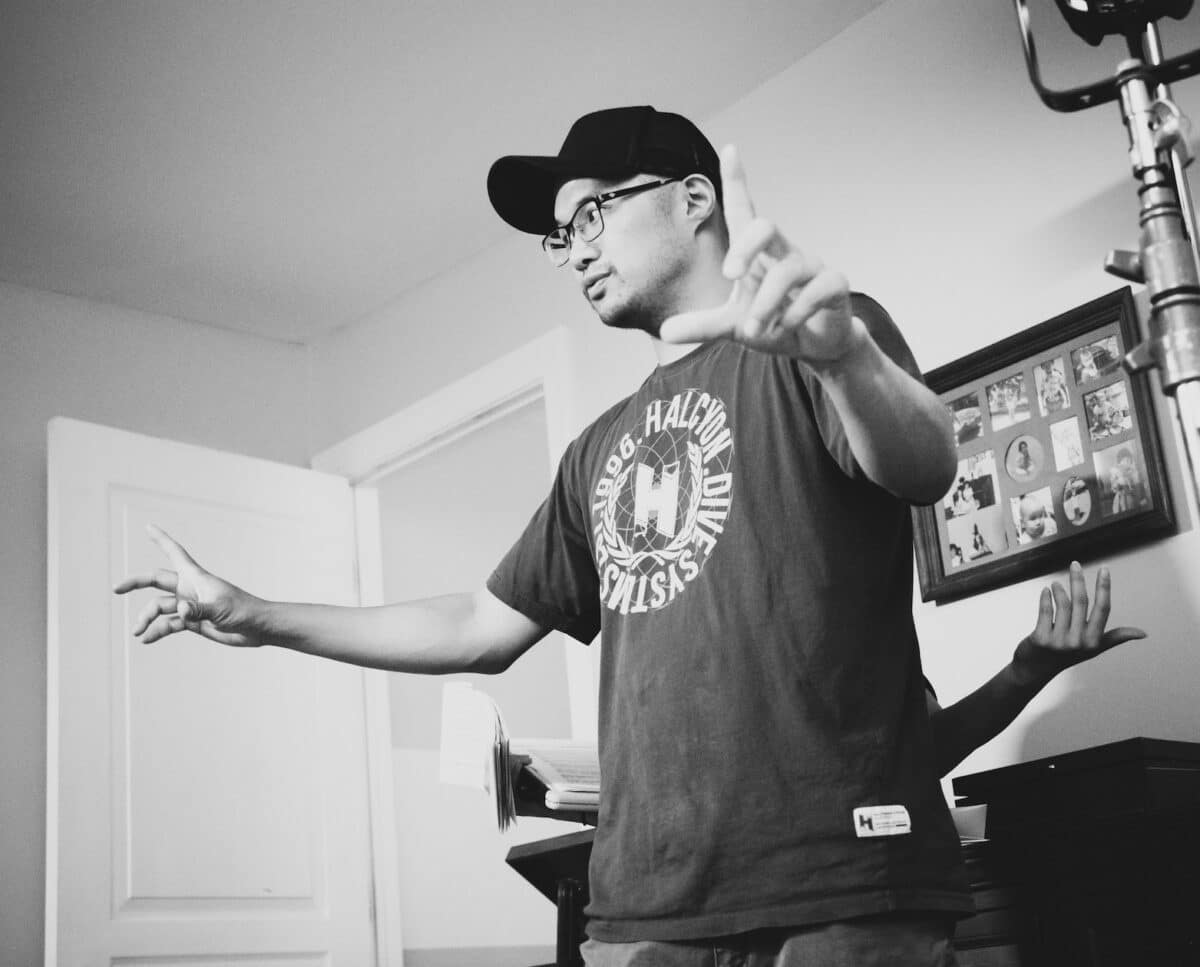
For me, listening to criticism, it’s never easy. Even constructive criticism. I don’t like it, but it’s like getting a shot. You don’t want to get a shot, but it’s going to help you in the end. Bryant Jen, for example, makes a lot of YouTube content, and his stuff is great. But he has a couple videos where people review bombed him. They might not like him, but he allows people to comment, and he tells me he reads every single comment. I feel that’s important. As long as it’s not a cyberbullying tone, I think harsh feedback can make you grow as a person. That’s something that I want to be able to do. As far as artistry goes, I don’t always know what works. I just try to do it, and I put it out there, and I hope it does well, but if it doesn’t, it’s a learning experience for me, and I try to go from there. That will become part of my identity.
Kris Mendoza: In terms of being an artist, I think that’s probably one of the biggest things, right? There’s a certain vulnerability about making something and sharing it with the rest of the world. In our working together, I can see that you are fairly comfortable knowing what feedback to take and how to maneuver around criticism. If you’re just creating something to please other people, it’s empty. Ultimately, this is a business, right? If you’re in the filmmaking business, there’s got to be a certain number of people that like it in order for you to continue doing what you’re doing, but putting your all into it or contributing a certain amount of sweat equity is important as a creative.
You were talking about failing… What is the greatest failure you’ve learned from at this point in your career?
Erik Lu: I don’t have a single momentary failure that I can think of at the moment, but maybe it is not putting myself out there enough. I get so self-critical sometimes that some ideas never see the light of day. I think people who are able to show their heart and how they feel and accept that people might not like it, to me, those people grow the most. I could have grown more if I were not as critical of myself.
I was watching a Twitch streamer the other day – and this is a really small thing – but the Twitch streamer was talking about some kind of sushi. It was inexpensive sushi, and she coined that as “poverty sushi.” She and some of her friends were laughing about it, but later that night, some of her fans were upset and she felt awful. She responded to all her fans with an apology. She learned that it was insensitive and that those kinds of jokes are, maybe, not acceptable.
She apologized to her audience when she realized that and grew from the moment, becoming more aware and more considerate. I admire people who are able to go out and show themselves to the world. My biggest failure is not putting myself out there enough because it means I am not exposing myself to criticism as much, where I think I could grow more as a person. That’s me in particular and concerning my work, too.
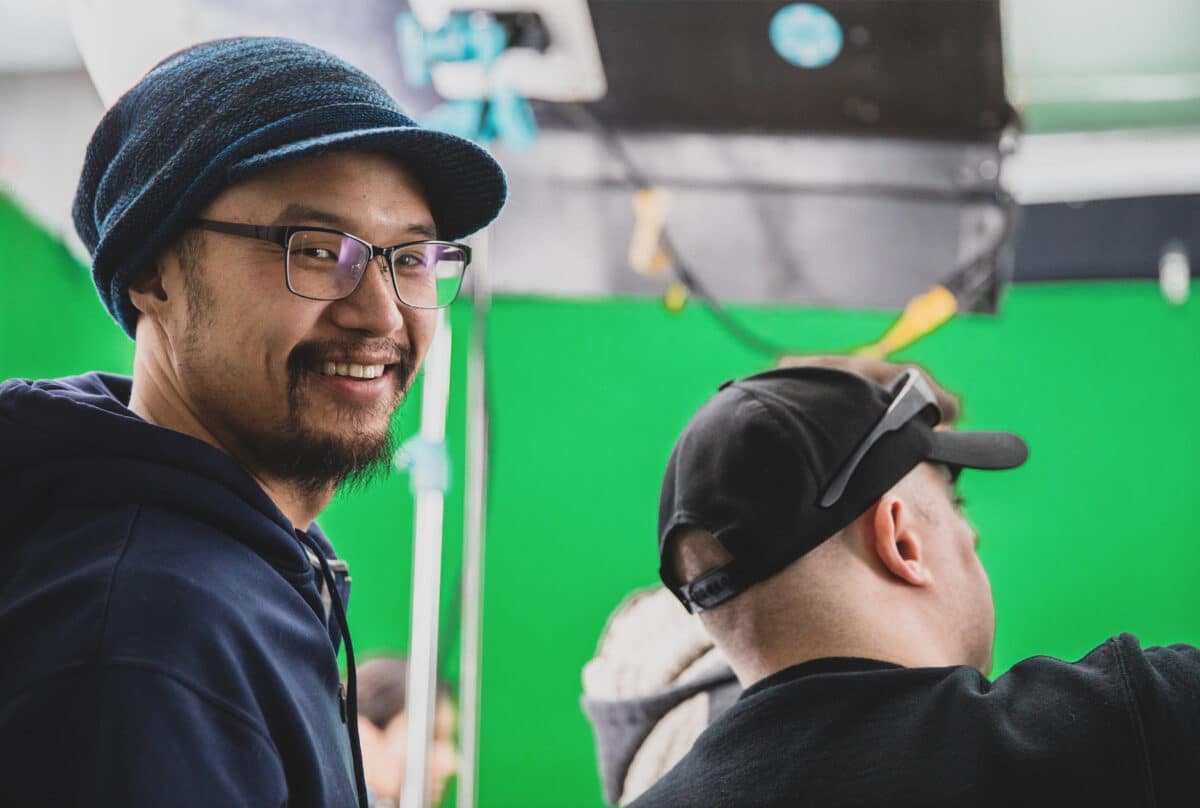
Looking back to my college-level maturity, I said a lot of dumb things. I think I was arrogant, and I thought I was a lot better than I actually was. I wasn’t careful, and I heard it from a lot of people, which helped humble me. It helped me to slow down and think about what I say before I say it. That was good for me. I’m embarrassed to admit how I was and I regret that I was like that, but that’s just the way I had to learn. I’m not naturally a smooth talker. I had to get beat down a little bit to understand the importance of slowing down and thinking things through. That’s just a human experience. That’s just part of learning. That’s part of growing up. I’m still making mistakes. Everyday.
Nobody’s perfect. You just need to acknowledge your mistakes and realize that you failed. It’s okay to mourn, but pick yourself back up and keep going. That’s the most important thing to me, as an artist and as a person.


